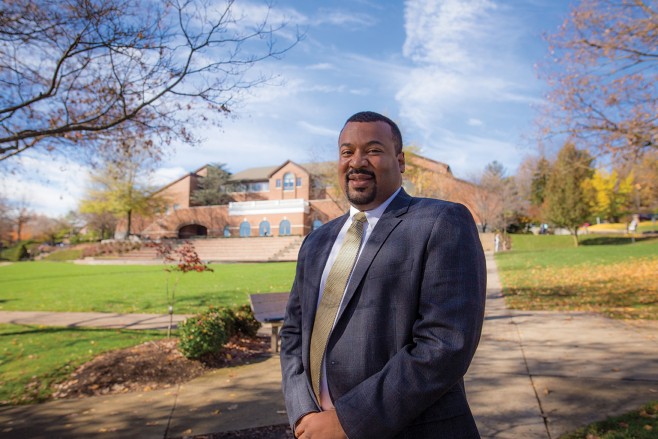
Cedric Moore Jr. ’99 gives his time to EMU as Alumni Council President
Cedric Moore Jr. ’99 knows what it’s like to be busy. Since graduating from EMU with a degree in social work, Moore has earned two more degrees, become a father, been appointed by the governor to an advisory board, and started his own business in partnership with his wife, who also holds a PhD. (Here’s a detailed breakdown of that previous sentence: he holds an MBA and a doctorate in strategic leadership; he is father to Brandon, 10, and Caitlyn, 4; in 2009, he was appointed to the Governor’s Advisory Board of Child Abuse and Neglect; and in 2010, he and his wife, Melinda, started Spectrum Transformation Group, which provides treatment to individuals with Autism Spectrum Disorder and with mental health concerns, with offices in Richmond and Harrisonburg, Virginia.)
Yet through those experiences, he has prioritized his connection to his alma mater and donated substantial amounts of time on the Alumni Council. In this Q & A, Cedric provides a stepping-off point for our exploration in this fall Crossroads issue of generosity, why we give and who inspires us.
Q What made your experience at EMU meaningful enough that you want to still be involved with the university after graduation?
A The entire EMU experience. Simply meaning the quality of education, caring professors and an environment grounded with Christian values.
Q How did you become interested in volunteering for Alumni Council?
A I can’t thank Doug Nyce ’85, former director of alumni and parent engagement, enough for encouraging me to take a serious look at the alumni council. Doug spoke highly of the individuals on the committee and the work of the council.
Q What does Alumni Council “do” and what are some of your responsibilities as president?
A The purpose of the alumni council is to directly involve alumni in the life of EMU and to serve as an advisory group. I was fortunate to serve as vice president under the presidency of Lenora Yutzy ’79 Bell.
The president presides at all meetings of the alumni council and the executive committee of the council; expedites objectives, goals, and policies of the council; appoints all other committees as needed in consultation with the executive committee; and reports at the annual business meeting of the alumni council.
While I embrace providing leadership and vision to the alumni council, I am hoping to communicate frequently with alums, current students, and staff to ensure the alumni council is doing the work expected.
Q What do EMU alumni share with current students?
A Definitely not the experience of the Suter Science Center! In all seriousness, I know we continue to share our Christian values and are accepting of those who choose to believe or think differently than we do.
Q Who taught you your earliest lesson in (or gave you an example of) generosity?
A My deceased grandmother, Shirley Roberts, taught not only me but other children in our neighborhood many life lessons. My parents taught us to “think of someone other than yourself.” But with all due respect, my grandmother stressed putting others first. Now, I have two mentors: one is Wayne Turnage, director of the District of Columbia Department of Health Care Finance and former chief of staff to Governor Tim Kaine, and another is former New York Knick and St. Catherine’s School head basketball coach Edmund Sherod. I hope I can be as good of a leader and mentor to others as they are to me.
Q If you could share a message with young alumni or recent graduates about giving back (not just to EMU but as a life value), what might you say?
A Continue to put forth your best efforts at all times, not just this time, but the next time. It is our responsibility to give back any way we can. Plus, it helps the EMU alumni participation rate!